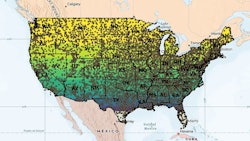VALLEY VIEW, OH (February 11, 2021) – Cannabis Business Times, Cannabis Dispensary and Hemp Grower magazines, owned by B2B publishing company GIE Media, Inc., announces the hiring of Anthony Lange as Associate Editor and Andriana Ruscitto as Assistant Editor to support the rapidly growing media brands.
Under the direction of Digital Editor Eric Sandy, Lange and Ruscitto will contribute primarily digital content to support the brands’ ongoing rise in web traffic, with additional contributions to the brands’ print magazines.

Anthony (Tony) Lange has been hired as Associate Editor for Cannabis Business Times, Cannabis Dispensary and Hemp Grower, where he will contribute both digital and print content. He spent the past decade working in the weekly newspaper business, contributing primarily to the Chagrin Valley Times as a beat reporter, sports editor, photographer and page designer. Before that, he was a staff assistant for a congressman in the U.S. House of Representatives in Washington, D.C., where he drafted responses to constituent letters and aided the communications director. Lange is a graduate of Kent State University with a Bachelor’s Degree in Journalism.
Andriana Ruscitto has been hired as Assistant Editor for Cannabis Business Times, Cannabis Dispensary and Hemp Grower magazines. Before joining GIE Media, Ruscitto attended Kent State University, where she worked in the university communications and marketing department, writing stories for the Kent State Today. Ruscitto graduated from Kent State in December 2020 with a Bachelor of Science degree in Public Relations and a minor in Marketing.

“We are excited to have Anthony and Andriana join our talented team of editors,” Editorial Director Noelle Skodzinski said. “They both bring unique experience and skillsets that are extremely valuable in serving the audiences of the Cannabis Group media brands. We look forward to seeing their careers flourish at GIE Media.”
“Tony and Andriana are coming on board to help accelerate even further the rapid growth in web traffic we have seen across all three media brands they will be working on,” said Sandy. “We are excited to tap their reporting skills to cover an even greater number of stories critical to our audiences at Cannabis Business Times, Cannabis Dispensary and Hemp Grower.”
GIE Media is currently seeking a Senior Editor for Cannabis Business Times and Cannabis Dispensary magazines. Click here for more information.
ABOUT CANNABIS BUSINESS TIMES
Cannabis Business Times was founded in July 2014 and is owned by GIE Media Inc. Its focus is to help accelerate the success of legal cannabis cultivators by providing actionable intelligence in all aspects of the business, from legislation, regulation and compliance news to analysis of industry trends and opportunities, as well as expert advice on cultivation, marketing, financial topics, legal issues, business management and more. Cannabis Business Times focuses strictly on the business of legal cannabis for medical and recreational use and aims to provide timely information—through its website, e-newsletter, mobile app, print magazine, Cannabis Conference and virtual education—to help the reader make timely, informed decisions to help them run their businesses better and more profitably.
ABOUT CANNABIS DISPENSARY
Cannabis Dispensary is the industry’s first true B2B media brand dedicated entirely to the retail and ancillary business segments of the legal cannabis market. Launched in November 2017 and owned by GIE Media Inc., Cannabis Dispensary is quickly becoming cannabis retailers’ go-to source for business and legislation news. In addition to industry news, Cannabis Dispensary provides dispensary owners/operators with actionable intelligence that they can use to make their businesses stand out in an increasingly competitive market.
ABOUT HEMP GROWER
Hemp Grower’s mission is to support legal hemp cultivators by providing actionable intelligence in all aspects of the business—from regulatory news to analysis of industry trends and business strategy, as well as expert advice on cultivation/farming, extraction, marketing, financial topics, legal issues and more. Hemp Grower focuses strictly on the business of legal hemp and aims to provide timely information—through its website, e-newsletter, print magazine, annual Cannabis Conference and virtual education—to help the reader make timely, informed decisions to help them run their hemp businesses more efficiently and more profitably.
ABOUT GIE MEDIA, INC.
GIE Media, based in Valley View, Ohio, was founded in 1980 and has grown over 36 years into a leading marketing and communications business-to-business media company serving 18 industries. The company goal of Group Interest Enterprises is to publish the highest quality business magazines, websites, e-newsletters, conferences, reference books and other forms of business media in growth industries, with a quality standard based upon editorial value and market leadership. The company employs more than 100 editors, publishers, sales representatives, marketers and other professionals.

























